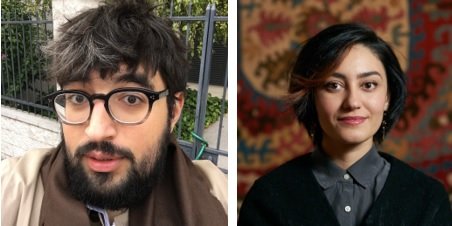Azad Asifovich and Asli Samadova

In 2021, 50 contemporary art curators, researchers, and museum professionals from 32 different countries were awarded support to attend the CIMAM 2021 Annual Conference, in-person and online.
For the first time, and thanks to the generous support of The Getty Foundation who sponsored the virtual platform, 27 grantees attended the conference online, while 23 attended onsite.
Launched in 2005, CIMAM’s Travel Grant Program is designed to foster cooperation and cultural exchange between contemporary art curators and museum directors in emerging and developing economies and their counterparts in other regions of the world.
Azad Asifovich's and Asli Samadova's Conference Report
With this letter, we would like to thank you for organizing this year's CIMAM Conference. Organizing an international conference is a big task in itself. Ensuring that a hybrid conference meets all current regulations and additional complexities that appear due to the Covid-19 pandemic from one side and exceeding the expectations in delivering an impactful and though igniting/provoking program is a challenge. However, the CIMAM team succeeded in this task by organizing the "Under Pressure: Museums in Times of Xenophobia and Climate Emergency" conference this year.
The world lives in times of uncertainty and growing political tensions, so the CIMAM conference developed and maintained sustainable professional relations and shared experiences across national borders. The present circumstances redefine the notion of 'togetherness' and invite us to look for alternative languages – onsite, online, or in between. Many cultural workers in Azerbaijan operate in a cultural vacuum precluded from integration in international art events and discourse due to language barriers, mobility (aggravated now, but also existed in pre-pandemic time), and other miscellaneous circumstances. Taking part in this conference was a unique learning and networking experience that would help to be up to date with current international discourse in the art and museum world on xenophobia, nationalism, and responses to humanitarian and environmental challenges. We were particularly interested in the topics discussed on the second day of the conference: museums as a non-hierarchical space of respect and a horizontal learning area. During the third day, we found several interesting and informative talks, but two were singular and inspiring for us. It was essential to look at the situation from the point of view of an artist – Otobong Nkanga and "none"-museum-related researcher Dr. Maristella Svampa. We found the presentation of the CIMAM Toolkit on Environmental Sustainability in Museum Practice inspiring and practical.
It was our first Annual Conference as a member of CIMAM and, unfortunately, both of us were unable to travel to Poland. Undoubtedly, no online experience can yet substitute in-person communication, the energy of physical gatherings, and the spontaneity of discussions. Nevertheless, the level of preparation that the CIMAM team put into the organization allowed many colleagues and us from all over the world to have the best experience we could have in the given circumstances. Online networking sessions were particularly well-thought-out networking tools as a substitute for physical socialization conferences.
New knowledge and discussions help us in our present-day tasks – building an organization from scratch in Azerbaijan: after 2.5 years of functioning as a nomadic self-organized art platform, Ta(r)dino 6 Art Platform succeeded in registering as a non-profit, non-government contemporary art organization in Azerbaijan, first in more than a decade. Ta(r)dino 6 supports the discourse on Azerbaijani contemporary art within an international context, focusing on gender, identity, and equality in the art world.
Kind regards,
Azad Asifovich and Asli Samadova Ta(r)dino 6 Art Platform
As young art workers, we are permanently questioning the adaptability of the art institution program to answer to the constantly changing world. We strongly believe that nowadays, to be able to offer horizontal and inclusive content, we need to be engaged more and more into professional and transcultural interactions, and the dialogue, through the meetings, conferences, colloquiums, etc., is the only method for calibrating compasses!